EASYJoint Select - Paving Grout
EASYJoint Select - Paving Grout

EASYJoint Select takes the easy-to-use, sweep-in formula of the original and applies that especially to ceramic and porcelain paving.
Suitable For all joints 3mm wide and over and perfect for natural stone and porcelain
Azpects sells tens of thousands of tubs of EASYJoint every month to satisfied customers all over the UK and to parts of Europe.
EASYJoint Select is available to buy in 5 colours as shown below. Colours may vary slightly due to colour differences on monitors and may not be a true reflection of the final product.
| Quick Find Code | 050095 |
|---|---|
| Manufacturer | Azpects |
| Container Coverage | 1 tub covers 10sqm on a 15.3sqm patio pack of mixed size paving slabs, please see spec for indepth measurements |
| Container Size | 12.5kg |
| Size | NA |
| Usage Instructions |
Wet Application Method This is the recommended method of application that should be used wherever possible. Extreme caution is advised if contemplating using EASYJoint without water. How to Use EASYJoint—Wet Application Method (Preferred Method) Whilst it is possible to apply EASYJoint dry, as described elsewhere in this publication, it is STRONGLY RECOMMENDED to lay it wet. There are exceptions to this; when temperatures are set to fall to 0˚ C before the joint has drained of water or where a strongly mixed foundation has been used, for say driveways etc. Items required:
Step 1 Wet the paving for a minimum of 10 minutes. Do not shortcut this process or worry if water settles in the joints - it will be displaced when the EASYJoint is swept in. The wetter the surface the better the end result - particularly with absorbent paving materials such as many varieties of natural stone.
Step 2 Open one bag and pour the contents onto the paving. If using the product for the first time, start with small quantities of EASYJoint, sufficient to work in a few minutes. NOTE. Do not pile up or leave EASYJoint standing in one spot, nor allow the paving to dry out with the compound on its surface.
Step 3 Spread the EASYJoint across the surface with a squeegee or broom, allowing it to fall into the joints. TIP. Keep your eye on the areas where you are not working and ensure they remain very wet at all times. This is particularly important in warm or hot weather conditions.
Step 4 Once you have opened and spread one or two tubs, using a hose on a “fan” or “spray” setting, flush the compound into the joints to ensure it fully settles to the bottom. Again, do not worry about the amount of water being used. You can do this as often as you like—after each tub is fine. Remember - the wetter the better!
Step 5 Top up any sagging joints with more EASYJo in t. Don’t be concerned about the mess for you are about to wash it in again with more water, repeating the process in Step 4. Continue to “top up” and “wash in” until you are satisfied. NOTE. Keep all of the paving soaking wet all of the time.
Step 6 Once all the joints are uniformly filled to within 1 or 2 millimetres of the surface of the paving, go over the entire area you have worked on and apply a final gentle spray of water to wash away any final traces of compound from the surface. This also assists to obtain a relatively smooth finish to the joint, although it will have a slightly coarse texture. Should any fine traces of sand remain do not sweep them away yet. Wait until the joints of the set are hard, (see Step 7).
Step 7 Optional. For a finer texture to the joint, "point" (otherwise known as “strike”) the compound with a suitable jointing iron or similar tool. This exercise should be carried out when the water has drained away and the paving surface has started to dry out. Ensure that the joint is not too soft and soggy — in this way the final “shape” of the joint will remain intact as it dries hard. Finally, once the joint has set hard, a final sweep across the paving with a stiff broom, working diagonally to the joints, will remove any last traces of EASYJoint from the paving, including any that is left proud around the joint from the pointing exercise.
Dry Application Method Step 1. Prior to using EASYJoint seal the paving surface and the joints with an appropriate sealant for the type of paving you are working with. In most instances, our own EASYSealSSP can be used. Please refer to the website www.easyseal.eu for more advice. If considering EASYSealSSP ensure you follow the instructions supplied with that product. It is important that the edges as well as the surface of the paving are properly sealed because the natural oils inherent in the EASYJoint can be absorbed into the paving not only from the surface but also from the edges along the joints. Sealing the paving material prior to installation (before it is laid) will give the best result. If however, that is not possible, then ensure the paving edges are sealed by applying the sealant with a low-pressure garden sprayer. This is a two-stage operation. First, run the nozzle of the spraying hose along the inside of the joint, fanning the liquid to ensure a coat is applied along both edges before secondly, applying a coat to the paving surface. We strongly recommend you apply two coats in the appropriate manner and timings as described in the instructions supplied with your sealant
Step 2. Allow the sealant to properly cure for at least 48 hours then test a small inconspicuous area before completing step 3 below. Complete the test by placing a spoonful of EASYJoint onto the surface of the sealed paving and letting it stand for 5 minutes before removing it. Wash the paving surface to remove any surface oil traces. When dry there should be no visible trace of the EASYJoint.
Step 3. Once the sealant has cured, dampen the surface using a little water — do not allow water to settle in the joints. Follow steps 2 & 3 of the Wet Application Method as described on pages 4 & 5. More attention should be given to compacting the joints as without water to assist it is possible for the EASYJoint not to fully fill the joint, resulting in a weaker joint. Use a pointing trowel or similar tool to aid compaction. Step 4. Sweep any excess EASYJoint from the surface of the paving. A little water may be used to assist the cleaning process but NOT MUCH; it is not desirable to have the joints filled with water.
Step 5. As with the Wet Application Method, if a fine texture to the joint is required, "strike" the compound with a suitable tool (see page 4 Step 7).
Step 6. If you have used the Dry Application Method because you are working with an impermeable base then you must protect the joint from rainfall for at least 36 hours or until the joint has set (if sooner), otherwise, you risk the problems detailed earlier on this page. Important Note The same rules apply when working with porcelain paving tiles as with working with stone or concrete. However, the When applying to porcelain, in order to ensure an effective joint, the operator MUST iron the joint to further aid |
Our standard method of delivery for heavy items is using the pallet delivery network. The delivery will arrive on a lorry with an electric tailift and a hand pump truck.
Access must be made for a lorry (up to 32ft) otherwise additional delivery charges may be payable. You must advise us of any restrictions that will impede the delivery vehicles from delivering the Products. The Products will be delivered to the kerbside outside. Our couriers are not insured to take goods onto your premises without permission. If you require the driver to come onto your property (at their discretion and deemed safe) with the wagon, the Products, or both, this is entirely at your own risk and if the driver or wagon damages anything (including but not limited to, manhole covers, tarmac driveways, block paved drives, flagged driveways / graveled or stoned driveways, grassed areas, walls, pillars, gate posts, gates, trees, hedges, telephone wires, lights) the cost of repair will be your responsibility.
Ensure that the delivery area is flat and solid enough to take the weight of a pallet truck carrying up to 1000kg in weight. Please note Gravel and Grass are not classed as solid and flat. If the delivery area is not flat the driver will require help in getting the pallets off the vehicle. If help cannot be given there will be a redelivery charge to deliver at a time when help can be given. If you live on a hill you will need to call us before you order to find out if our delivery company can deliver to your address. This is for health and safety reasons, usually the easiest method of getting around this is for the order to be delivered to the nearest flat ground. It will be your responsibility to move the goods to your property. Deliveries via hiab or moffet can be arranged but at an additional cost, click for further details.
Smaller items will be delivered via a parcel courier.
All delivery methods will require someone to accept the delivery, check it over and sign that they have been received in good condition. Please note any damages on the delivery sheet / electronic device, do not use the product and contact us straight away.
Next day, AM/PM or even Saturday deliveries can be arranged at an extra cost. Please add your items to the shopping cart for an instant quote.
Pallet Deliveries
After your order has been dispatched you will be contacted on the phone (within 3 days), by your local pallet delivery company in your area, once they receive the goods from our local depot, to book-in a day that is convenient for you. (this will not occur on Timed, Next Day & Saturday deliveries)
Parcel Deliveries
After your order has been dispatched you will receive your goods within 2-3 days. No telephone book-in will occur.
Remember when handling your goods:
- Take care when removing the packaging / banding and also when removing the product out of the crate / pallet as they may have weakened during transit and could be unstable.
- The product is quite heavy, and some larger products can weigh a lot. Consider this when arranging the delivery, as you may need appropriate lifting equipment, or an extra pair of hands.
To ensure you prepare adequately for pallet deliveries please watch the video below for a comprehensive guide and also read the full delivery guide https://lsd.co.uk/delivery-details

Frequently Asked Questions and Answers
OTHER COLOUR OPTIONS
-
 Monsoon Black - Project Pack£779 .16 per packinc VAT
Monsoon Black - Project Pack£779 .16 per packinc VAT -
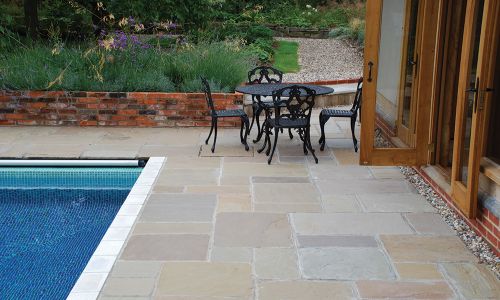 York Green - Project Pack£607 .70 per packinc VAT
York Green - Project Pack£607 .70 per packinc VAT -
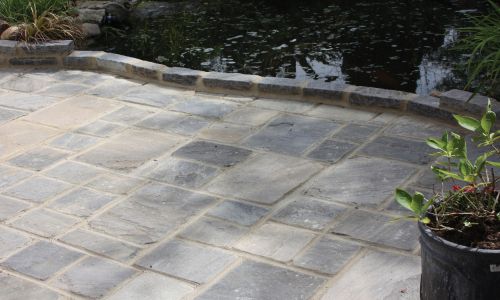 Cobbles - Monsoon Black - Project Pack£841 .73 per packinc VAT
Cobbles - Monsoon Black - Project Pack£841 .73 per packinc VAT -
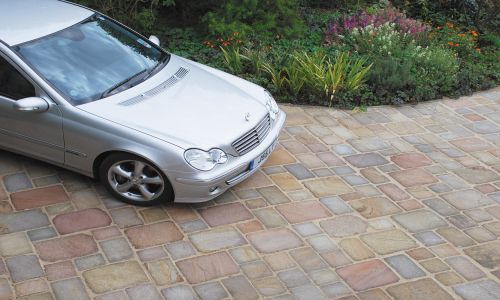 Cobbles - York Green - Project Pack£774 .47 per packinc VAT
Cobbles - York Green - Project Pack£774 .47 per packinc VAT -
 Walling - Monsoon Black - Blocks
Walling - Monsoon Black - BlocksFrom £207 .73 per m2
inc VATProduct OptionsName Pack size m2 Price Per m2 Units per pack Price 325 x 100mm 4.50m2
£207.73
185 £934 .79 per packinc VAT215 x 100mm 4.50m2
£209.30
280 £941 .86 per packinc VAT325 x 100mm - Individual - - - £7 .92 per blockinc VAT215 x 100mm - Individual - - - £5 .28 per blockinc VAT -
 Walling - York Green - Blocks
Walling - York Green - BlocksFrom £188 .89 per m2
inc VATProduct OptionsName Pack size m2 Price Per m2 Units per pack Price 325 x 100mm 4.50m2
£188.89
185 £850 .00 per packinc VAT215 x 100mm 4.50m2
£188.89
280 £850 .00 per packinc VAT215 x 100mm - Individual - - - £4 .72 per blockinc VAT325 x 100mm - Individual - - - £7 .15 per blockinc VAT -
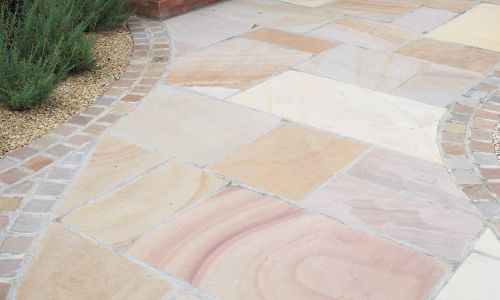 Buff Brown - Paving Slabs
Buff Brown - Paving SlabsFrom £19 .43 per m2
inc VATProduct OptionsName Pack size Per m2 Pcs per pack Project Pack - 600 Series 15.30m2
£27.72
48 £424 .06 per packinc VAT900 x 600mm 15.12m2
£29.20
28 £441 .52 per packinc VAT600 x 600mm 14.40m2
£29.46
40 £424 .20 per packinc VAT600 x 300mm 22.95m2
£19.43
85 £445 .85 per packinc VAT300 x 300mm 7.65m2
£34.24
85 £261 .91 per packinc VAT900 x 600mm - Individual - - - £22 .22 per slabinc VAT600 x 600mm - Individual - - - £14 .82 per slabinc VAT600 x 300mm - Individual - - - £7 .42 per slabinc VAT300 x 300mm - Individual - - - £3 .70 per slabinc VAT -
 Castle Grey - Single Sizes
Castle Grey - Single SizesFrom £27 .72 per m2
inc VATProduct OptionsName Pack size Per m2 Pcs per pack Project Pack - 600 Series 15.30m2
£27.72
48 £424 .06 per packinc VAT900 x 600mm 15.12m2
£29.20
28 £441 .52 per packinc VAT600 x 600mm 14.40m2
£29.46
40 £424 .20 per packinc VAT600 x 300mm 15.30m2
£29.14
85 £445 .85 per packinc VAT300 x 300mm 7.65m2
£34.24
85 £261 .91 per packinc VAT900 x 600mm - Individual - - - £22 .22 per slabinc VAT600 x 600mm - Individual - - - £14 .82 per slabinc VAT600 x 300mm - Individual - - - £7 .42 per slabinc VAT300 x 300mm - Individual - - - £3 .70 per slabinc VAT -
 Mint - Single Sizes
Mint - Single SizesFrom £27 .72 per m2
inc VATProduct OptionsName Pack size Per m2 Pcs per pack Project Pack - 600 Series 15.30m2
£27.72
48 £424 .06 per packinc VAT900 x 600mm 15.12m2
£29.20
48 £441 .52 per packinc VAT600 x 600mm 14.40m2
£29.46
40 £424 .20 per packinc VAT600 x 300mm 15.30m2
£29.14
85 £445 .85 per packinc VAT300 x 300mm 7.65m2
£34.24
85 £261 .91 per packinc VAT900 x 600mm - Individual - - - £22 .22 per slabinc VAT600 x 600mm - Individual - - - £14 .82 per slabinc VAT600 x 300mm - Individual - - - £7 .42 per slabinc VAT300 x 300mm - Individual - - - £3 .70 per slabinc VAT -
 Global Stone - Sandstone Collection - Modak Rose - Paving Slabs
Global Stone - Sandstone Collection - Modak Rose - Paving SlabsFrom £27 .72 per m2
inc VATProduct OptionsName Pack size Per m2 Pcs per pack Project Pack - 600 Series 15.30m2
£27.72
48 £424 .06 per packinc VAT900 x 600mm 15.12m2
£29.20
28 £441 .52 per packinc VAT600 x 600mm 14.40m2
£29.46
40 £424 .20 per packinc VAT600 x 300mm 15.30m2
£29.14
85 £445 .85 per packinc VAT300 x 300mm 7.65m2
£34.24
85 £261 .91 per packinc VAT900 x 600mm - Individual - - - £22 .22 per slabinc VAT600 x 600mm - Individual - - - £14 .82 per slabinc VAT600 x 300mm - Individual - - - £7 .42 per slabinc VAT300 x 300mm - Individual - - - £3 .70 per slabinc VAT -
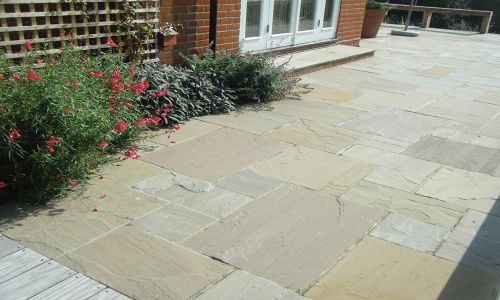 York Green - Paving Slabs
York Green - Paving SlabsFrom £27 .72 per m2
inc VATProduct OptionsName Pack size Per m2 Pcs per pack Project Pack - 600 Series 15.30m2
£27.72
48 £424 .06 per packinc VAT900 x 600mm 15.12m2
£29.20
28 £441 .52 per packinc VAT600 x 600mm 14.40m2
£29.46
40 £424 .20 per packinc VAT600 x 300mm 15.30m2
£29.14
85 £445 .85 per packinc VAT300 x 300mm 7.65m2
£34.24
85 £261 .91 per packinc VAT900 x 600mm - Individual - - - £22 .22 per slabinc VAT600 x 600mm - Individual - - - £14 .82 per slabinc VAT600 x 300mm - Individual - - - £7 .42 per slabinc VAT300 x 300mm - Individual - - - £3 .70 per slabinc VAT -
 Buff Brown - Circles
Buff Brown - CirclesFrom £313 .84 per pack
inc VATProduct OptionsName Dimensions Price 2 Ring Circle 1.8m £313 .84 per packinc VAT3 Ring Circle 2.8m £471 .65 per packinc VAT4th Ring (Outer Ring Only) 3.6m £380 .08 per packinc VAT -
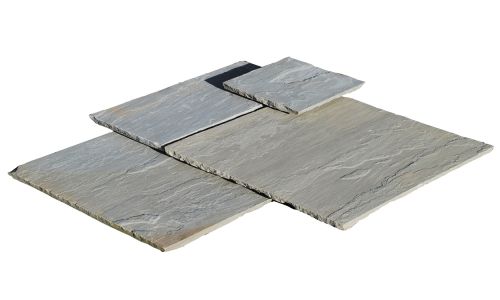 Castle Grey - Circles
Castle Grey - CirclesFrom £313 .84 per pack
inc VATProduct OptionsName Dimensions Price 2 Ring Circle 1.8m £313 .84 per packinc VAT3 Ring Circle 2.8m £471 .65 per packinc VAT4th Ring (Outer Ring Only) 3.6m £380 .08 per packinc VAT -
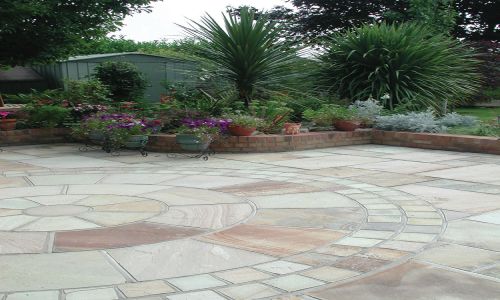 Mint - Circles
Mint - CirclesFrom £313 .84 per pack
inc VATProduct OptionsName Dimensions Price 2 Ring Circle 1.8m £313 .84 per packinc VAT3 Ring Circle 2.8m £471 .65 per packinc VAT4th Ring (Outer Ring Only) 3.6m £380 .08 per packinc VAT -
 Modak Rose - Circles
Modak Rose - CirclesFrom £313 .84 per pack
inc VATProduct OptionsName Dimensions Price 2 Ring Circle 1.8m £313 .84 per packinc VAT3 Ring Circle 2.8m £471 .65 per packinc VAT4th Ring (Outer Ring Only) 3.6m £380 .08 per packinc VAT
FURTHER PRODUCTS IN THIS CATEGORY
-
 Jointex - Ceramic Extra Fine
Jointex - Ceramic Extra Fine£60 .00 per item
inc VATProduct OptionsName Price Neutral - 15Kg Stone Grey - 15Kg -
 EASYGrout - Porcelain Paving Slurry Grout
EASYGrout - Porcelain Paving Slurry Grout£65 .24 per item
inc VATProduct OptionsName Price Blanco - 15KG £65 .24 per iteminc VATCrema - 15KG £65 .24 per iteminc VATArgent - 15KG £65 .24 per iteminc VATGrafito - 15KG £65 .24 per iteminc VAT -
 EASYJoint Porcelain - Grout
EASYJoint Porcelain - Grout£78 .78 per item
inc VATProduct OptionsName Price White Gold - 15KG £78 .78 per iteminc VATSilver - 15KG £78 .78 per iteminc VAT -
 EASYJoint Pro - Grout
EASYJoint Pro - Grout£114 .35 per item
inc VATProduct OptionsName Price Mushroom - 17kg £114 .35 per iteminc VATStone Grey - 17kg £114 .35 per iteminc VATBasalt - 17kg £116 .64 per iteminc VAT -
 PrimeTec - External Primer for Porcelain & Natural Stone
PrimeTec - External Primer for Porcelain & Natural Stone£37 .70 per item
inc VATProduct OptionsName Price 20kg Bag £37 .70 per iteminc VAT -
 JointTec - Brush-In Jointing Compound
JointTec - Brush-In Jointing Compound£32 .40 per item
inc VATProduct OptionsName Price Granite Grey - 15Kg £32 .40 per iteminc VATPitch Black - 15Kg £32 .40 per iteminc VAT -
 PorTec - External Porcelain Grout
PorTec - External Porcelain Grout£37 .70 per item
inc VATProduct OptionsName Price Dove Grey - 12.5Kg £37 .70 per iteminc VAT -
 EASYJoint - Grout
EASYJoint - Grout£46 .74 per item
inc VATProduct OptionsName Price Mushroom - 12.5Kg £46 .74 per iteminc VATBasalt - 12.5Kg £46 .74 per iteminc VATBuff Sand - 12.5Kg £46 .74 per iteminc VATStone Grey - 12.5Kg £46 .74 per iteminc VAT -
 Pavetuf - Jointing Compound
Pavetuf - Jointing Compound£45 .65 per item
inc VATProduct OptionsName Price Jointing Compound - Buff - 15kg Jointing Compound - Grey - 15kg Jointing Compound - Black - 15kg -
 SBR Bond - 5L£15 .13 per iteminc VAT
SBR Bond - 5L£15 .13 per iteminc VAT -
 Jointex - Easy Joint
Jointex - Easy Joint£49 .20 per item
inc VATProduct OptionsName Price Neutral - 25Kg Out of stockStone Grey - 25Kg Out of stockNeutral - 15Kg Out of stockStone Grey - 15Kg Out of stockBasalt - 15Kg Out of stock -
 Rompox D1
Rompox D1£95 .40 per item
inc VATProduct OptionsName Price Neutral - 25Kg Out of stockStone Grey - 15Kg Out of stockBasalt - 25Kg Out of stock -
 Rompox Easy
Rompox Easy£38 .34 per item
inc VATProduct OptionsName Price Neutral - 25Kg Out of stockNeutral - 15Kg Out of stockStone Grey - 15Kg Out of stockBasalt - 15Kg Out of stock -
 Flowpoint Fine
Flowpoint Fine£33 .00 per item
inc VATProduct OptionsName Price Natural Grey - 20kg £33 .00 per iteminc VATCharcoal - 20kg £33 .00 per iteminc VAT -
 A-Joint Pro
A-Joint Pro£90 .00 per item
inc VATProduct OptionsName Price Neutral - 25Kg £90 .00 per iteminc VATStone Grey - 25Kg £90 .00 per iteminc VATBasalt - 25Kg £90 .00 per iteminc VAT -
 A-Joint Ready
A-Joint Ready£40 .80 per item
inc VATProduct OptionsName Price Neutral - 15Kg Stone Grey - 15Kg Basalt - 15Kg -
 A-Joint Ready Flex
A-Joint Ready Flex£62 .40 per item
inc VATProduct OptionsName Price Neutral - 15Kg Stone Grey - 15Kg Basalt - 15Kg -
 Priming Slurry - 17kg£34 .93 per iteminc VAT
Priming Slurry - 17kg£34 .93 per iteminc VAT








